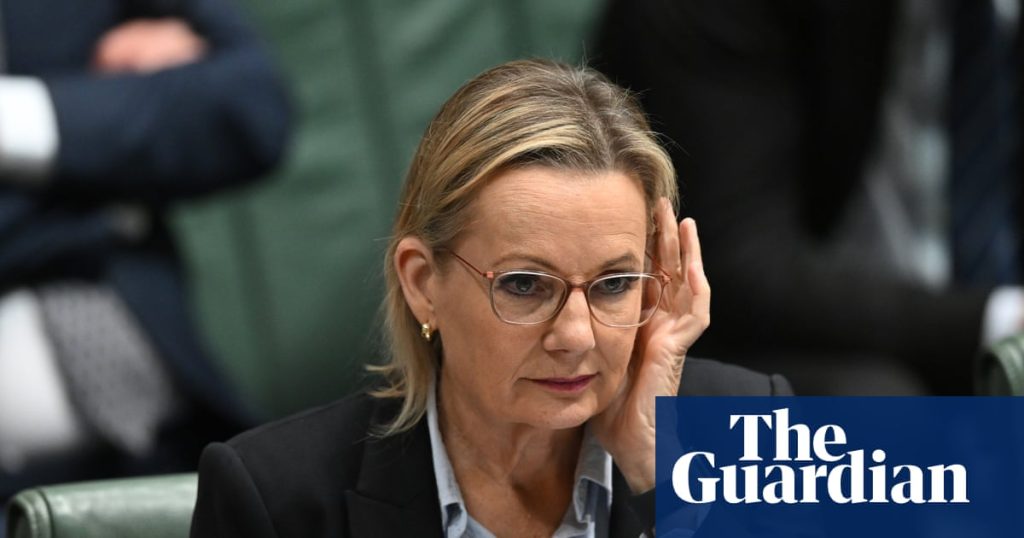Liberal voters want the party to pursue more progressive policies and not spiral further into right-wing positions, according to a new poll that shows far more Australians back a net zero climate target than oppose it.
The latest Guardian Essential poll also shows Sussan Ley retains a slight edge as the most popular choice to lead the Coalition, slightly ahead of Andrew Hastie and Senator Jacinta Nampijinpa Price.
But despite troubled waters for the Coalition, it isn’t all smooth sailing for the Labor government, with most voters unconvinced about Anthony Albanese’s meeting with Donald Trump and the much-vaunted critical minerals deal.
The poll, which surveyed 1,041 voters last week, found an electoral appetite for the Coalition to explore a more moderate policy offering. Asked “what direction do you think the Liberal party should be taking to provide an alternative government for Australia?”, 48% said they should adopt more progressive positions, while 28% said they should maintain their current position. The least popular response, at 24%, was to adopt more conservative positions.
The support for more progressive positions was higher among the 236 voters in the poll who identified as Coalition supporters, with 49% calling for more progressive positions, 23% backing current positions and 29% wanting more conservative policies.
As the Liberal and National parties resume a bitter internal debate about whether to keep or dump their net zero targets first agreed by the Morrison government in 2021, the Essential poll canvassed support for net zero. In total, 44% of voters supported net zero and 27% were against, with 29% neither supporting nor opposing.
Sign up: AU Breaking News email
Among Coalition voters, 35% supported net zero and 38% were opposed. Labor and Greens voters shared identical results, with 60% in favour and 13% opposed.
Peter Lewis, executive director of Essential Media, said the polling showed “the dissonance of the noise coming from the actual partyrooms”.
“The numbers suggest Liberal voters are looking at the current debate and want the Libs to mainstream the party,” he said. Essential has conducted qualitative research for the Labor party.
Ley is in no danger of an imminent challenge to her leadership, but a series of messy policy debates, internal disquiet and public stumbles has heaped pressure on her position.
Sign up to Breaking News Australia
Get the most important news as it breaks
Privacy Notice: Newsletters may contain information about charities, online ads, and content funded by outside parties. If you do not have an account, we will create a guest account for you on theguardian.com to send you this newsletter. You can complete full registration at any time. For more information about how we use your data see our Privacy Policy. We use Google reCaptcha to protect our website and the Google Privacy Policy and Terms of Service apply.
after newsletter promotion
Ley’s personal approval rating dipped again, falling to 32% approval and 43% disapproval, a net approval rating of minus-11. That is down from minus-9 (32-41%) earlier this month and minus-2 (35-37) in August.
Asked who would be the best person to lead the Liberal party, 13% of voters said Ley, while 10% each voted for Hastie and Price. Angus Taylor, who Ley defeated in a partyroom ballot, scored 7%, while 12% said “somebody else” and 42% said “don’t know”.
Among Coalition voters specifically, 22% backed Ley and 20% Hastie, with Price on 13% and Taylor on 9%. Among Coalition voters, 24% were unsure and 5% said someone else.
“Sussan Ley obviously is suffering in her leadership, but nobody else is on the rise. When given the options, the majority of voters will either opt for someone else or nobody,” Lewis said of the polling.
Asked about Albanese’s meeting with Trump, only 37% thought the outcomes would be good for Australia’s long-term interests, while 18% said it would bad; another 26% thought it would have no impact and 20% were unsure.
On specific outcomes, 42% of people were supportive of Trump’s endorsement of the Aukus pact, but just 38% supported Australia providing US access to a port facility in Fremantle and the critical minerals deal.
“These are also warning signs for the government that despite the rave reviews for the prime minister’s performance in Washington, the actual substance of the agreement with the US doesn’t have majority support,” Lewis said.

